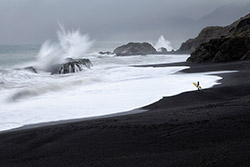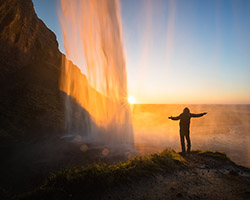
|
|
|||||
|
Featured Photographer, December 2015: Casey McCallister
Our sincere thanks to Casey McCallister for accepting our invitation to be our featured guest photographer this month. We really appreciate his time, and his willingness to share his wonderful photography with us all! Please visit his links to see more of his work, and to let him know you enjoyed this interview. :: Your bio mentions a long love affair with the outdoors, but how did photography enter the scene? What about this medium drew you in, as opposed to something like painting or drawing? I have a huge appreciation for all types of art, but I have never attempted painting or drawing. I do, however, take loads of inspiration from paintings, in particular. Art History was one of my favorite courses in college. There, I discovered the Hudson River School movement of landscape painters. The way that light is visualized within their art has had a huge impact on my work. It's almost made me look at a scene differently in how the colors and shapes will be represented on a screen rather than mountains and rivers in the real world. I always like to approach a composition knowing exactly how it will be handled in post production. It's funny how things in life work out. I never intended on entering this
field, but as every little interest in my life was blended together the
resulting recipe was a photographer. If I was to look at myself today
through the eyes of my 10 year old self, there's no way I would ever had
seen this outcome, but I wouldn't have it any other way.
:: You seem to approach photography from the perspective that you're not always out to make the prettiest fine art image possible; it almost always seems to me you let the scenario dictate which method of photography would be best, and then go from there. It doesn't seem to be all sunsets and big foregrounds. What makes the way you approach photography different from other outdoor photographers? I will always be two kinds of photographers and both have a huge influence on how I plan trips. First, there's adventurer/photographer. This side will always lead me down the road less traveled. It involves no planning, is very free spirited and focused on the adventure itself. These trips really have turned into glorified scouting trips for the fine art photographer in me. Photography has always come secondary to the adventure, but as it has grown
from a hobby to something that provides income, I have begun to shift from
less adventurer to more of photography as a forethought. This side of me is
the planner. The light chaser. This style is more cinematic and involves
endless planning and obsessing over ever minor detail of a photograph.
Here, I put more emphasis on capturing the right light and waiting hours or
days for the right moment. My best photos have come when I have really
taken the time to slow down and work a single composition. It is a form of
meditation. Both sides show up in my work.
:: What are your presets, and what made you create them? How tough was it to create them? Instagram came around in late 2010 and moved the idea of photo filters into the mainstream. Since then, a vintage style has started to trend in photography. With Instagram being mobile only, in 2011 I replicated the in-app filters for the desktop using Lightroom presets (I'm required to mention that they have no affiliation with Instagram whatsoever). There are many out there today, but mine were some of the first created and garnered lots of press back when that kind of thing was rare. I've since gone on to make a few other packs available on my site. Editing a photo is one of my favorite parts of photography, so I would never endorse presets as a one-click-all solution to post-processing. I do, however, believe they provide a great starting point for every photograph and can be helpful in kickstarting the inspiration process. The skill involved in creating them wasn't too difficult, however the tough
part came in having them work with every photo. No two photographs are
the same and I spent lots of time using multiple photographs to make sure
the desired effect is achieved across all range of photos.
:: I think one of the things that has always impressed me with your work, is that you are not traditional in a lot of ways in terms of how you market yourself. You don't push large fine art prints, workshops, and don't interact and engage in the way most social media folks do. Is there a set way you sit down to market yourself, knowing that you're not dealing with what a lot of photographers would consider their primary income streams? I have the luxury of my personal photography not being my full time job. I still work a 9-5. With that comes benefits in how I market my work, but also has it's downsides, as well. Humility has become one of the best ways to market my work. Something feels dirty to me about self-promotion and bragging on social networks about how many times you've travelled to a location or the vague-booking about working with this company and that company. It may end up being my downfall, but I despise tooting my own horn. I want my work itself to inspire others to travel off the beaten path and create their own story, not just follow the same trails I've been down. I do sell prints here and there and occasionally will do a one-on-one
workshop, but most of my photography income comes from people reaching out
to me directly. Perhaps, as my photography continues to provide more income
than my 9-5, I will become more aggressive in how I market.
:: The bucket list on your webpage is awesome. I encourage everyone who hasn't seen it, to take a look. What made you put it up publically, and does having it online change the way you deal with the items on it? Do you find there is any kind of common theme to the things you've put on it? For years I kept piles of notes, newspaper clippings and printed out
articles to which I called my bucket list. It was my place to go to
daydream. Eventually it began to fall apart and I lost some of it, so I
moved it online in the form of a checklist. I've never wanted to simply
check items off for the sake of checking them off. I still want to
experience each item in full. In that sense, there's no real pressure to
having it online. The list has a common theme of getting outside and
traveling, but really if it successfully inspires one person to accomplish
their goals in any form then making it public was a success. I hope that it
can encourage people to change their perspective on life and realize that
most of the things that we spend our time on are trivial in the whole sense
of the world.
:: What is the one thing on the bucket list that will disappoint you the most if you don't accomplish it, and why? Nothing in particular. The idea isn't to put pressure on myself to complete
it. I keep it updated and maintained for inspiration and to remind me to
focus on what the big picture really is. There are some items that I need
to do while I'm still young and able-bodied and some that will require
quite a bit of preparation, but ultimately I plan for the list to occupy
the rest of my life. I intend to hand down to my children to discover
anything I can't fulfill.
:: You moved to California to be closer to the ocean; what is it about that environment that drew you in? Photographically, what do you like about that subject that maybe the mountains and other subjects lack? The ocean, and California in general, has always been a lure for me. "Go west, young man" the famous quote says, and ever since I traveled to California on a family vacation as a kid I knew I would wind up here. California has a certain way to it. Things move a little slower and a creative spirit shines through in everyone. Everyone I speak to has a project to discuss, whether it is in Silicon Valley or even photographers and the passion for our art. The ocean has presented new challenges in my
photography and I've yet to even come close to mastering how to get the
perfect shot. If there's one thing I have discovered is a firm rule that if
you're not getting wet, the shot will be mediocre. Every photo I have
walked away happy with has left me with soaked jeans and ruined sneakers,
but a keeper shot is priceless. In some ways photographing the ocean is
more difficult than mountains. Maybe it has come with experience, but I can
typically tell where the shadows and highlights of light will fall on a
mountain just from an observation. The ocean is always changing. Each
sunset is different and in some ways that makes it more fun. You never know
exactly what you will walk away with. That said, the mountains will always
be home. There's no better feeling than watching the sun set from the
mountaintops.
:: What projects do you have coming up in the next few months that you're excited about? I have picked up a drone and have been stoked on learning to fly it and
capture photos from the air. Aerial photography is a whole new art form
which brings about a new set of challenges, but also presents so many new
angles and perspectives on the world. Through that, I've also been
experimenting in the world of video, but have a long way to go before
anything sees the light of day. As far as travel, I will be laying low for
the winter months, but plan to travel to Alaska for a 10-day adventure
through the glaciers next year.
:: What is your favorite piece of non-photographic equipment? A simple notebook. Writing things down seems to have become a lost art.
:: What's the scariest thing that has happened to you while on a photography shoot? I took a rough fall off a Colorado 14er that chipped a few teeth and
rattled my head a little, but aside from that, and a few minor unexpected
encounters with bears and moose, nothing too scary. You could say I've been
pretty lucky.
:: Finish this thought: "When my time in photography is finished, I'd like people to remember my work as...." Inspirational. I don't want to be known as a documentarian; I'd rather someone look at my work and be able to dream about being somewhere new,
sharing an adventure with loved ones.
:: Photography, I think, spans a lot of different realms. How do you think the future of photography looks in each of the following categories moving forward? Technology: Technology will continue to advance. Ten years ago, a DSLR was out of the price range for most consumers. Today, an iPhone can capture images worthy of displaying on billboards. It seems like camera updates are coming out so quickly that new technology is out before a new camera even hits the shelves. Ultimately, my philosophy is that cameras are simply tools. With the playing field so level and the barrier of entry so small, it is pretty rare that something new will capture something that other tools are technically unable to. That makes me comfortable as it's not as important to stay on top of new technologies in order to remain competitive. Socially: As cameras continue to become more affordable and high quality photos can be taken on something as small as a mobile phone, photography will continue to grow in the social aspect. Networking has already become a vital aspect of running a successful photography business. It's amazing how the Internet and social networks bring us access to new communities of people that we otherwise never would have come across. I've met, and every day continue to meet, some of my best friends through photography and I imagine that will continue to be the case as the social aspect of photography continues to evolve. Environmentally: In particular, as an outdoor photographer, it is encouraging to see so many
new people out enjoying nature and all the earth has to offer. However, as
the number of people enjoying these wild locations with their cameras
continues to increase, it is important to remain conscious that we are only
visitors to this planet. Leave no trace is the number one rule when
adventuring off the beaten path and it is important that everyone follow
it. I want to be able to share my favorite places with my children the way
that I experience them today.
:: If you weren't in the photography business, what would you be doing? Being in a position to create things for others is something I enjoy. I've
spent time as a marketer and web developer and could see myself doing
either. I also cherish every second spent outdoors. As technology becomes
more a part of our daily lives, I feel it's more important than ever to
prioritize time spent outside. I have a passion to explore and encourage
others to do the same, so I could see a park ranger or wilderness first
responder being something I would enjoy.
:: What is the one aspect of photography that makes you want to pull your hair out, scream, and leave the profession all together? The quest for likes and followers as some kind of currency. I got into
photography for the art form, to share my adventures with family and
friends, and as an excuse to travel more. It makes little sense to me those
that pick up a camera to collect imaginary Internet points and even less
sense to use this as a measurement for quality of work. Photography seems
to create a lot of egos and too often this is reflected when meeting
photographers who's work I admire. Of course, I have also met some of my
best friends and gained valuable advice from plenty of mentors, as well, so
it's give and take. Luckily this kind of stuff is easy to avoid simply by
focusing on myself and always improving my own work. It would take a lot to
make me quit photography all together. I love it too much.
:: What advice would you give to someone looking to get into travel and outdoor photography? Don't stop shooting. Photograph everything you see and everything that captures your interest. Point your camera at things that bring you joy. With digital photography, it is impossible to shoot too much. Get up early and stay out late and eventually you'll find a niche. Seek those out who's work you admire and ask for advice. There's a wealth of information available for new photographers. Never stop learning and perfecting your craft. Value every photograph you take and reflect that in how you represent your work. |
"I want my work itself to
inspire others to travel off the beaten path and create their own story,
not just follow the same trails I've been down."
Photographer Spotlight Interviews
|
|
 |
Other Cool Stuff→ Past Workshop Photos → 72dpi.com → How-To Articles → Photographer of the Month |
 |
Contact Us→ Contact Us → About Us → Site Map |
© 2009-2024 Aperture Academy, Inc.









